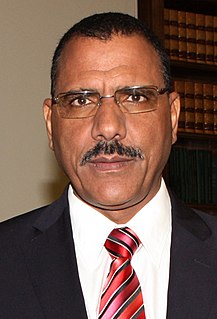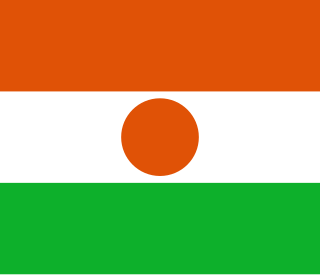
Politics of Niger takes place in a framework of a semi-presidential representative democratic republic, whereby the President of Niger is head of state and the Prime Minister of Niger head of government, and of a multi-party system. Executive power is exercised by the government. Legislative power is vested in both the government and the National Assembly.
Hama Amadou is a Nigerien politician who was Prime Minister of Niger from 1995 to 1996 and again from 2000 to 2007. He was also Secretary-General of the National Movement for the Development of Society (MNSD-Nassara) from 1991 to 2001 and President of the MNSD-Nassara from 2001 to 2009. Amadou is from the Kurtey, a Fula sub-group, and was raised in the Tillaberi Region, in the Niger River valley, north of Niamey.

Lieutenant Colonel (ret.) Mamadou Tandja is a Nigerien politician who was President of Niger from 1999 to 2010. He was President of the National Movement of the Development Society (MNSD) from 1991 to 1999 and unsuccessfully ran as the MNSD's presidential candidate in 1993 and 1996 before being elected to his first term in 1999. While serving as President of Niger, he was also Chairman of the Economic Community of West African States from 2005 to 2007.

Elections in Niger take place within the framework of a semi-presidential system. The President and National Assembly are elected by the public, with elections organised by the Independent National Electoral Commission (CENI).

The National Movement for the Development of Society is a political party in Niger. Founded under the military government of the 1974-1990 period, it was the ruling party of Niger from 1989 to 1993 and again from 1999 until a coup on February 18, 2010, by a military junta called the Supreme Council for the Restoration of Democracy (CSRD) ousted the president, Mamadou Tandja.

The Nigerien Alliance for Democracy and Progress is a political party in Niger. Moumouni Adamou Djermakoye led the party from its foundation in 1992 until his death in 2009.
Souley Abdoulaye is a Nigerien politician. He served as the Prime Minister of Niger from 28 September 1994 to 8 February 1995. He later served in the government under President Ibrahim Baré Maïnassara as Minister of Transport from 1996 to 1997 and then as Minister of the Interior, in charge of police and internal security, from 1997 to 1999.

Mohamed Bazoum is a Nigerien politician who has been President of the Nigerien Party for Democracy and Socialism (PNDS-Tarayya) since 2011. He served in the government of Niger as Minister of Foreign Affairs from 1995 to 1996 and again from 2011 to 2015. He was Minister of State at the Presidency from 2015 to 2016, and he has been Minister of State for the Interior since 2016.
Moumouni Adamou Djermakoye was a Nigerien politician and the President of the Nigerien Alliance for Democracy and Progress. He was an important minister during the regime of Seyni Kountché and subsequently served as Niger's Ambassador to the United States from 1988 to 1991; later, after founding the ANDP, he served as President of the National Assembly of Niger from 1993 to 1994. He was the ANDP's candidate in four presidential elections, beginning in 1993; he was also a deputy in the National Assembly from 1999 to 2009 and the President of the High Court of Justice from 2005 to 2009.
Hassoumi Massaoudou is a Nigerien politician who has served in the government of Niger as Minister of Finance since 2016. A leading member of the Nigerien Party for Democracy and Socialism (PNDS-Tarayya), he was Minister of Communication, Culture, Youth and Sports from 1993 to 1994, President of the PNDS Parliamentary Group from 1999 to 2004, Director of the Cabinet of the President from 2011 to 2013, Minister of the Interior from 2013 to 2016, and Minister of National Defense in 2016.
Issoufou Assoumane is a Nigerien politician who has been President of the Union of Nigerien Democrats and Socialists since 2001. He served in the government of Niger as Minister of Mines and Energy from 1995 to 1996 and as Minister of the Environment from 2000 to 2001.

Parliamentary elections were held in Niger on 12 January 1995. The last elections of the Third Republic, they were called following a split in the ruling coalition, but resulted in a government divided between the party of the President and an opposition coalition with a majority in the National Assembly and the post of Prime Minister. The ensuing stalemate was a contributing factor to the coup that overthrew the regime on 27 January 1996.

General elections were held in Niger on 31 January 2011 to elect the President and National Assembly, with a second round of the presidential elections on 12 March. The first round of the presidential elections was originally scheduled to be held on 3 January and the second round on 31 January, but was later postponed. The elections followed a military coup in February 2010 that ousted President Mamadou Tandja.














